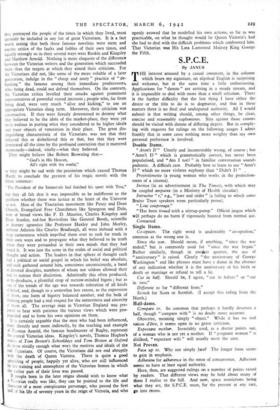S.P.C.E.
By JANUS
THE interest aroused by a casual comment, in the column which bears my signature, on slipshod English is surprising and welcome, but at the same time a little embarrassing. Applications for "damns" are arriving in a steady stream, and it is impossible to deal with more than a small selection. There is the further difficulty that the last thing I have either the desire or the title to do is to dogmatise, and that in these matters there is no final and undisputed authority. All I would submit is that writing should, among other things, be clear, concise and reasonably euphonious. Sins against those canons should be visited with damns of differing degree. But in comply- ing with requests for rulings on the following usages I admit frankly that in some cases nothing more weighty than my own personal preference is involved.
Double Damn.
" Aren't I?" Utterly and incontestably wrong, of course ; but "Amn't I? " which is grammatically correct, has never been popularised, and "Am I not? " in familiar conversation sounds pedantic. A difficult case. Probably best to learn to use " Amn't I? " which no more violates euphony than " Didn't I? "
Projecticmette (a young woman who works in the projection- room of a cinema).
Invitee (in an advertisement in The Times), with which may be coupled amputee (in a Ministry of Health circular).
Intrusive " r," e.g., " lawr and order " (a failing to which some Brains Trust speakers seem particularly prone).
"Low couponage."
" Has been issued with a stirrup-pump." Official jargon which will perhaps do no harm if vigorously banned from normal use. Contacted.
Single Damn.
Co-option. The right word is undeniably " co-optation," common as the wrong one is.
Since the war. Should mean, if anything, " since the war ended," but is commonly used for " since the war began." Rather similarly, though in another quarter, the use of " anniversary " is raised. Clearly " the anniversary of George Washington " and like phrases must have a damn in the absence of any indication whether it is the anniversary of his birth or death or marriage or refusal to tell a lie.
Cut in half. Should be, I agree, " cut in halves " or " cut in two."
Different to for "different from."
Scotch for Scots or Scottish. (I accept this ruling from the North.)
Half-damn.
Compare to. So common that perhaps it hardly deserves a half, though " compare with " is no doubt more accurate.
Objective, meaning simply "object." While it has no real raison d'être, it seems open to no grave criticism.
Expectant mother. Invariably used, as a doctor points out, of a woman who is not yet a mother. If " pregnant woman " is disliked, " expectant wife " will usually meet the case.
Not Proven.
Face up to. Why not simply face? The longer form seems to gain in emphasis.
Adhesion for adherence in the sense of concurrence. Adhesion seems to have at least equal authority.
Here, then, are suggested rulings on a number of points raised by readers. That different views may be held about many of them I realise to the full. And now, space restrictions being what they are, the S.P.C.E. must, for the present at any rate, go into recess.


























 Previous page
Previous page